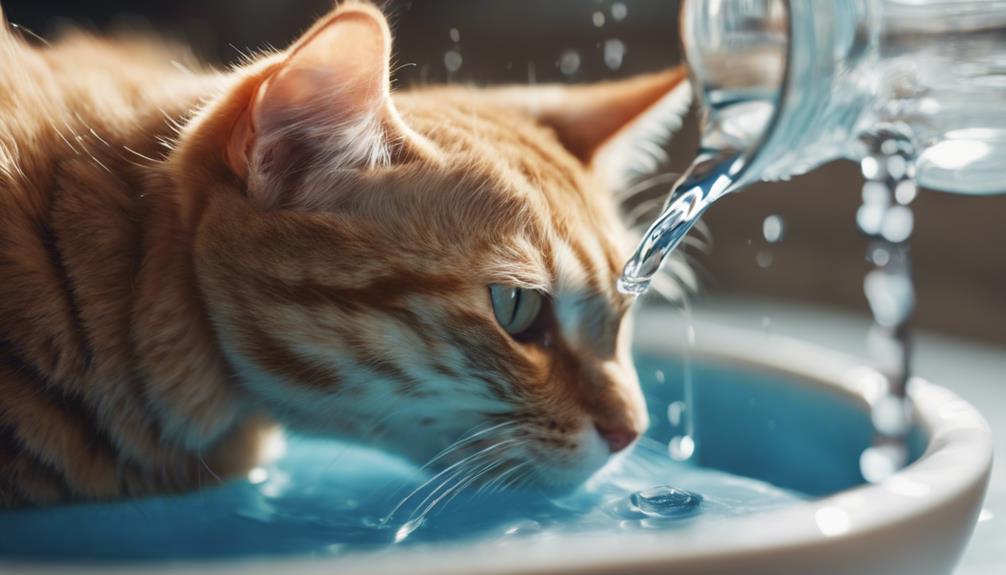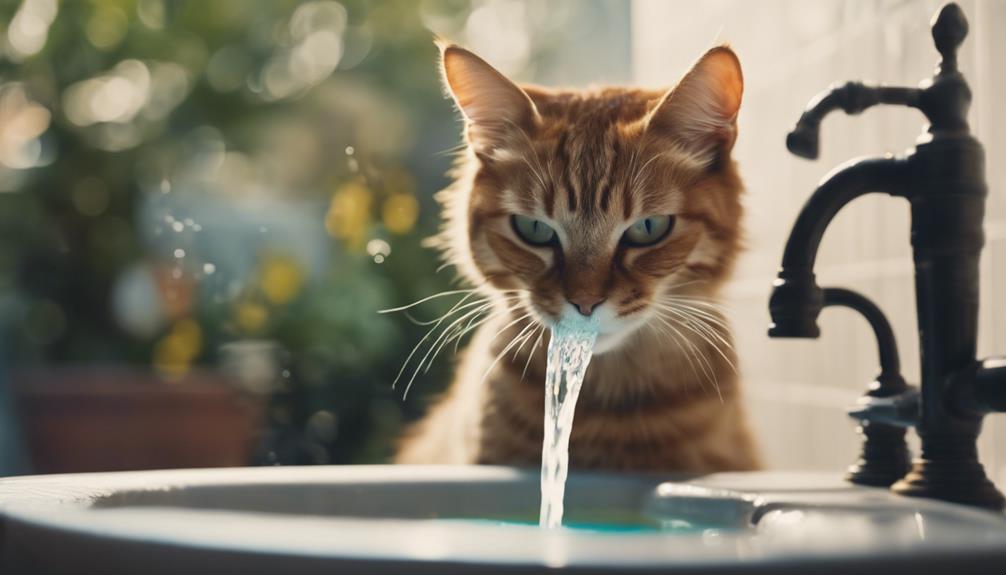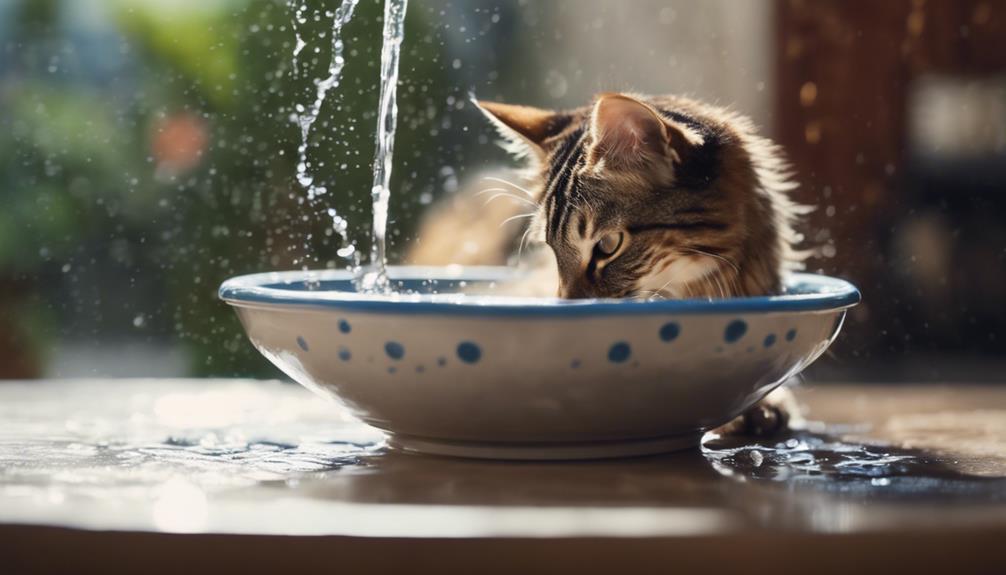Water is an indispensable element in the realm of feline health, with cats' urgent need for adequate hydration being a cornerstone of their overall well-being. The importance of water for cats goes beyond mere sustenance, playing a vital role in various physiological functions that are critical to their health.
Understanding the intricacies of feline hydration requirements is key to ensuring that cats thrive and remain healthy. As we unravel the layers of cats' essential need for water, a deeper appreciation for the profound impact of hydration on their vitality emerges, prompting a closer examination of this fundamental aspect of feline care.
Key Takeaways
- Cats require sufficient water intake daily for their health and well-being.
- Dehydration can be detrimental to cats, leading to serious health issues.
- Encouraging water consumption through various strategies is crucial for cat owners.
- Monitoring and ensuring a cat's hydration needs are met is essential for their overall health.
Importance of Water for Cats
The significance of hydration for cats is paramount to their overall well-being and health. Adequate water intake is essential for various physiological functions, including digestion, circulation, and temperature regulation.
Cats typically have a low thirst drive, making it vital for pet owners to ensure they have access to fresh water at all times. Normal water intake for a cat ranges from 40–60 milliliters per kilogram of body weight per day, equating to approximately 250 milliliters daily.
Monitoring your cat's water consumption is crucial, as changes can indicate underlying health issues. Ensuring that your feline friend stays well-hydrated plays a crucial role in preventing dehydration and supporting their overall health and vitality.
Signs of Dehydration in Cats
Detecting dehydration in cats is crucial for maintaining their health and well-being. Cats can be masters at hiding signs of dehydration, making it essential for owners to be vigilant. Some common signs of dehydration in cats include dry, tacky gums, sunken eyes, loss of skin elasticity (skin tents and doesn't bounce back quickly when pinched), lethargy, decreased appetite, and panting.
Additionally, increased heart rate, dry nose, and concentrated urine can also indicate dehydration. If you notice any of these symptoms in your cat, it is important to seek veterinary care promptly. Dehydration can be a serious issue, especially for sick or older cats, and early detection is key to preventing further complications.
Factors Influencing Water Intake

Factors impacting water intake in cats include their diet composition, environmental conditions, and overall health status.
A diet high in dry food can lead to lower water intake, as cats usually obtain moisture from their food. Environmental factors such as temperature and humidity can also influence a cat's water consumption. Cats living in hot or dry climates may need to drink more water to stay hydrated.
Additionally, a cat's health status plays a crucial role in determining its water intake. Illnesses that cause increased urination or decreased thirst can result in inadequate hydration.
Monitoring these factors can help ensure that cats maintain proper water intake levels for optimal health.
Risks of Inadequate Hydration
Insufficient hydration in cats poses significant health risks, emphasizing the critical importance of monitoring and maintaining their water intake levels. Cats that do not consume enough water are at high risk of developing dehydration, which can lead to a range of health issues.
Dehydration can cause urinary tract problems, such as urinary tract infections and kidney stones, as well as contribute to constipation and other digestive issues. Moreover, inadequate hydration can impact a cat's overall well-being, affecting energy levels, coat quality, and organ function.
It is crucial for cat owners to be vigilant about their feline companions' water intake to prevent these potential health complications associated with dehydration.
Tips to Increase Cat's Water Intake

To enhance a cat's water intake, implementing practical strategies can be beneficial in ensuring their hydration needs are met effectively. Providing canned food with high water content, mixing warm water into the canned food, and adding an ice cube or canned tuna juice to the water are effective ways to encourage cats to drink more.
Setting up a pet water fountain and washing it regularly can also attract cats to drink more water. Additionally, washing water bowls frequently and removing any water deposits can make the water source more appealing to cats.
Monitoring and Managing Hydration Levels
To effectively ensure a cat's optimal health and well-being, it is crucial for pet owners to closely monitor and manage their feline companion's hydration levels. Regular monitoring of a cat's water intake and hydration status is essential to prevent dehydration and maintain overall health. The following table outlines key points to consider when monitoring and managing a cat's hydration levels:
| Monitoring and Managing Hydration Levels | |
|---|---|
| Regular Water Intake Assessment | Track daily water intake amounts |
| Observation of Hydration Status | Check for signs of dehydration |
| Consulting a Veterinarian | Seek advice if changes in water intake occur |
| Hydration Strategies | Provide access to fresh water sources |
| Behavioral Monitoring | Assess any changes in drinking habits |
Cat Water Consumption FAQs

Understanding cats' water consumption habits and needs is essential for maintaining their health and well-being.
Cat Water Consumption FAQs:
- How much water should a cat drink daily?
- Cats should drink about 250 milliliters of water per day.
- Why might a cat avoid drinking water?
- Cats may avoid water due to cleanliness issues or pain, among other reasons.
- What are strategies to encourage water consumption in cats?
- Provide canned food with high water content.
- Mix warm water into canned food.
- Add an ice cube or canned tuna juice to water.
- Set up a pet water fountain and wash it regularly.
Frequently Asked Questions
Can Giving My Cat Milk Instead of Water Help With Hydration?
While milk is a popular choice for cats, it is not a suitable replacement for water to maintain hydration. Water is essential for cats' well-being. Ensure your cat has access to fresh, clean water daily.
Are There Any Specific Breeds of Cats That Require More Water Intake Than Others?
Certain cat breeds, like the Maine Coon and Siamese, may have higher water intake needs due to their size or activity levels. However, individual variations in hydration requirements among cats are more common.
How Can I Tell if My Cat Is Drinking Enough Water if They Have Access to an Outdoor Water Source?
To monitor your cat's water intake with outdoor access, observe their water bowl level daily. Track any changes in their drinking habits or weight. Consider using a water fountain to encourage more consumption. Consult a vet if concerned.
Is It Possible for a Cat to Overhydrate, and What Are the Signs to Look Out For?
Yes, cats can overhydrate, leading to water intoxication or hyponatremia. Signs include vomiting, lethargy, bloating, and in severe cases, seizures or coma. Ensure water access but monitor intake. Seek vet guidance promptly.
Are There Any Medical Conditions That Can Cause Excessive Thirst in Cats, Leading to Increased Water Consumption?
Excessive thirst in cats, potentially due to medical conditions, can lead to increased water consumption. This behavior warrants veterinary attention to identify underlying health issues promptly and provide appropriate treatment to ensure the well-being of the cat.
Can Lack of Vaccinations Affect a Cat’s Urgent Need for Water?
Yes, the lack of proper cat vaccinations guide essentials can affect a cat’s urgent need for water. Vaccines protect against serious illnesses that could affect a cat’s overall health, including their hydration levels. Ensuring your cat is up to date on vaccinations is essential for their well-being.
Conclusion
In conclusion, the significance of water for cats cannot be overstated. Adequate hydration is crucial for maintaining feline health and preventing dehydration-related complications.
By understanding the importance of water intake, caregivers can take proactive measures to ensure their cats stay properly hydrated. Monitoring and managing hydration levels, recognizing signs of dehydration, and implementing strategies to increase water intake are essential steps in promoting the overall well-being and vitality of our feline companions.




